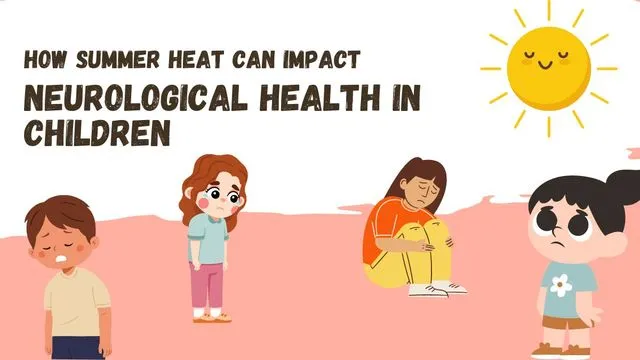- By Priyanka Munshi
- Fri, 10 May 2024 12:37 PM (IST)
- Source:JND
Did you know that children's brain health can be negatively impacted by prolonged summer heat? Dehydration brought on by high temperatures can affect cognitive performance by causing headaches, exhaustion, and trouble concentrating. Extended exposure to heat can also raise the risk of heatstroke, which can include convulsions, disorientation, and dizziness.
Furthermore, children who suffer from neurological disorders like autism or epilepsy may experience worsening symptoms due to heat-related stress. As a result, it's critical that parents and other adults provide enough fluids, look for shade, and refrain from taking their kids outside during the hottest parts of the summer in order to keep them cool and hydrated. In a conversation with Jagran English, Dr. Vinit Banga, who is an Associate Director of Neurology at BLK Max Super Speciality Hospital in Delhi, talked about how the summer heat can impact neurological health in children.
-1715324820645.jpg)
Children with neurological disorders like autism or epilepsy may experience worsening symptoms.(Image Credit:Canva)
According to Dr. Vinit, as temperatures rise during the summer months, it’s essential to be mindful of how the heat can affect children’s neurological health. While summer is synonymous with outdoor fun and activities, it also brings about an increased risk of various ailments, including those impacting the nervous system in children. Understanding these risks and taking proactive measures can help ensure a safe and enjoyable summer for kids.
How Heatstroke Impacts The Neurological Health Of Children?
One of the primary concerns during the summer is heat-related illnesses, such as heatstroke and heat exhaustion. These conditions can have significant neurological consequences, particularly in children, whose bodies may struggle to regulate temperature efficiently. Heatstroke, in particular, can lead to confusion, dizziness, and even seizures, posing a severe threat to a child’s health.
Also Read: 5 Tricks To Get Rid Of Bad Breath With Easy Lifestyle Changes
How Does Dehydration Impacts The Neurological Health Of Children?
Dehydration is another common issue during the summer months, especially when children are engaging in physical activities outdoors. Dehydration can affect cognitive function and concentration, making it difficult for children to focus and participate fully in activities. In severe cases, dehydration can lead to electrolyte imbalances, which may manifest as seizures or other neurological symptoms.
How Sun Exposure Impacts The Neurological Health Of Children?
Excessive sun exposure can also contribute to neurological problems in children. Prolonged exposure to ultraviolet (UV) radiation can lead to sunburn, which, in severe cases, can cause swelling and inflammation of the skin. Additionally, repeated sunburns over time may increase the risk of skin cancer, including melanoma, which can metastasize to the brain and other parts of the body.
-1715324840116.jpg)
It's crucial for parents and adults to provide adequate fluids, seek shade, and avoid outdoor activities during hot summer months.(Image Credit:Canva)
How Do Other Summer Activities Impacts The Neurological Health Of Children?
Summer activities often involve increased exposure to environmental toxins, such as pesticides and pollutants. These substances can have neurotoxic effects, potentially leading to developmental delays, cognitive impairments, and other neurological disorders in children. It’s essential to minimize exposure to these toxins whenever possible, especially in areas where they are prevalent.
What Are The Preventive Measures That Should Be Taken During The Summer For Children?
Preventing neurological ailments in children during the summer requires a combination of education, awareness, and proactive measures. Parents and caregivers should be vigilant in monitoring children for signs of heat-related illnesses, such as excessive sweating, fatigue, nausea, and confusion. Ensuring adequate hydration and providing shaded areas for rest can help prevent heat-related ailments.
Additionally, it’s crucial to protect children from excessive sun exposure by using sunscreen, wearing protective clothing, and seeking shade during peak UV hours. Limiting outdoor activities during the hottest parts of the day can also reduce the risk of heat-related illnesses and sunburns.
In conclusion, Dr. Vinit emphasized that while summer is a time for fun and outdoor adventures, it’s essential to be aware of the potential impact of heat and sun exposure on children’s neurological health. By taking proactive measures to prevent heat-related illnesses, dehydration, sunburns, and exposure to environmental toxins, parents and caregivers can help ensure a safe and healthy summer for children.

